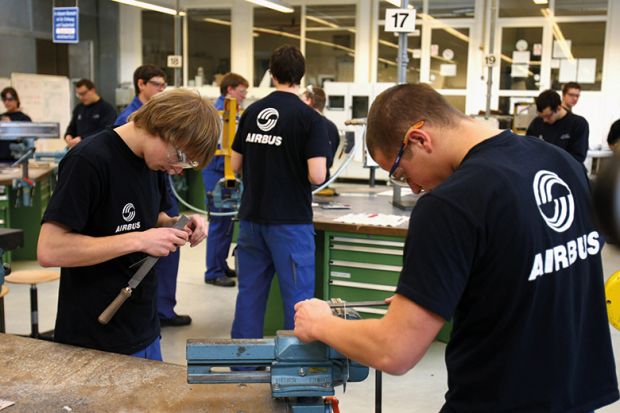England is “on the verge of a significant success story” in degree apprenticeships but government and the new Institute for Apprenticeships need to offer support, according to a Universities UK report.
The report, based on a survey of 66 universities and published on 9 March during National Apprenticeships Week, finds that there are “at least 60 universities and other higher education institutions across England currently implementing or planning to implement degree apprenticeships” for 2017-18.
Degree apprenticeships, co-designed by employers and higher education institutions, offer students the chance to gain professional skills through study for a full degree without paying tuition fees, while in paid employment for at least 30 hours a week.
Most growth is focused in “chartered manager, digital and technology, and engineer-related degree apprenticeships”, the report says.
Employers including Mercedes-Benz, Nestlé, IBM, Airbus and Transport for London are already working with universities to offer degree apprenticeships, says UUK.
The report, titled Degree Apprenticeships: Realising Opportunities, finds that there will be a 658 per cent increase in degree apprenticeship entrants between 2015-16 and 2017-18, from 640 to 7,611.
The report recommends that government “continue and increase efforts to publicise and raise understanding of degree apprenticeships”, including making employers fully aware of their availability.
In addition, the Institute for Apprenticeships should make sure higher education institutions “are as engaged, involved and supported as all other providers”, the report says.
“We are on the verge of a significant success story, one that will promote local opportunities and growth, improve productivity and contribute to the industrial strategy,” it concludes.
“Now is the time for the government and the new Institute for Apprenticeships to ensure that their policies and processes support the success of all apprenticeships and meet the needs of all providers.”
Julia Goodfellow, Universities UK president and University of Kent vice-chancellor, said: “Many people feel they have been left behind in the drive to increase higher-level skills in recent years. Degree apprenticeships are an excellent way to get to these harder-to-reach groups, while at the same time ensuring that what we deliver on campus meets the needs of students, the local area and its employers.
“The report shows that there is a still long way to go in communicating to students and employers how degree apprenticeships work and the mutual benefits. We would urge the government to work with us to do more here as part of its industrial strategy.
“The artificial dividing line between academic and vocational education is gradually disappearing. Degree apprenticeships build on the work that universities already do to deliver skills that employers need.”
Register to continue
Why register?
- Registration is free and only takes a moment
- Once registered, you can read 3 articles a month
- Sign up for our newsletter
Subscribe
Or subscribe for unlimited access to:
- Unlimited access to news, views, insights & reviews
- Digital editions
- Digital access to THE’s university and college rankings analysis
Already registered or a current subscriber? Login







